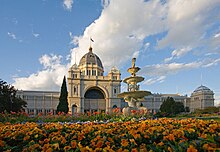Melbourne Centennial Exhibition
| Melbourne Centennial Exhibition | |
|---|---|
 The Royal Exhibition Building | |
| Overview | |
| BIE-class | Unrecognized exposition |
| Name | Melbourne Centennial Exhibition |
| Area | 63 acres |
| Visitors | 2,003,593 |
| Participant(s) | |
| Countries | 34 |
| Location | |
| Country | Colony of Victoria |
| City | Melbourne |
| Venue | Carlton Gardens |
| Coordinates | 37°48′22″S 144°58′13″E / 37.80611°S 144.97028°E |
| Timeline | |
| Opening | 1 August 1888 |
| Closure | 9 March 1889[1] |
| Universal expositions | |
| Previous | Melbourne International Exhibition (1880) in Melbourne |
| Next | Exposition Universelle (1889) in Paris |
The Melbourne Centennial Exhibition was organised to celebrate a century of European settlement in Australia. The Exhibition Building, constructed in 1880 for the Melbourne International Exhibition, was extended and reused. The Centennial Exhibition focused on Australia itself, and emphasised music and painting that attracted many visitors.[2] However the Exhibition was not recognised by the Bureau of International Expositions as a "world's fair".
Parer & Higgins Co. paid £1250 to operate the bar and light refreshments, one of only three areas where the sale of alcohol was permitted.[3]
Dora Elizabeth Armitage was at the Exhibition, where she won a medal for her typing. Her testimonial about her Calligraph typewriter was used by its manufacturers in their advertising.[4]
References
[edit]- ^ The Argus (Melbourne, Vic.), 11 March 1889, p.6 [1]
- ^ "Ceremonial Key - Melbourne Centennial Exhibition 1888 Opening, Victoria, Australia, 1888". Retrieved 24 May 2019.
- ^ Parer, Ben (16 February 2018). "Parer & Higgins serve alcohol to the world". Parer History. Retrieved 29 January 2024.
- ^ "Advertising - The Dawn (Sydney, NSW : 1888 - 1905) - 5 Nov 1889". Trove. Retrieved 28 August 2024.
